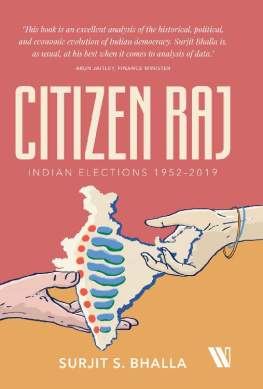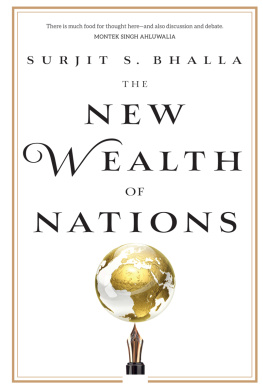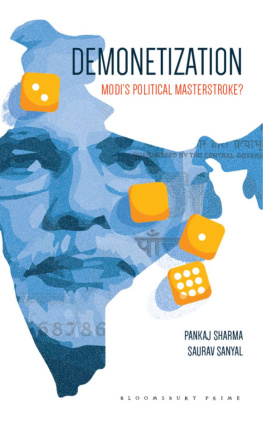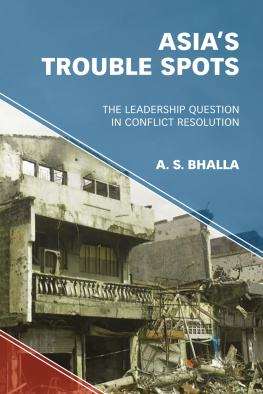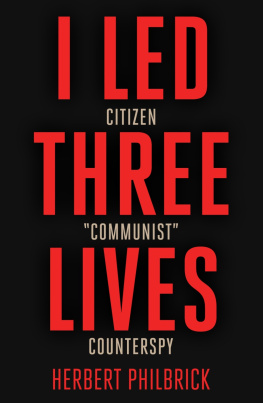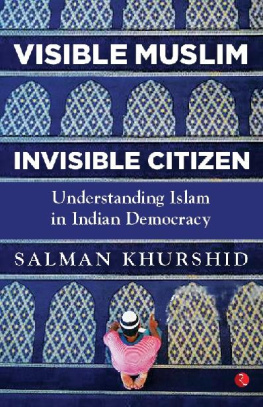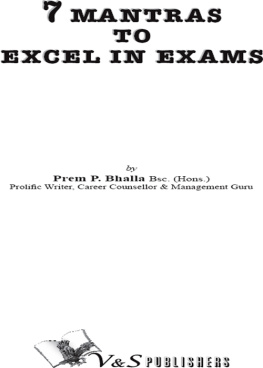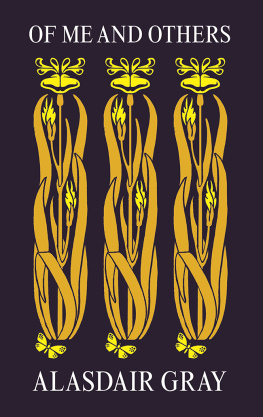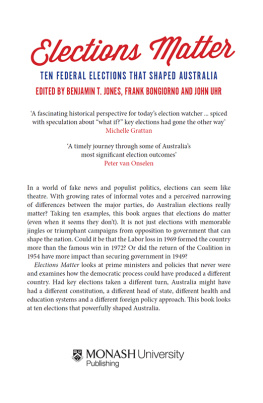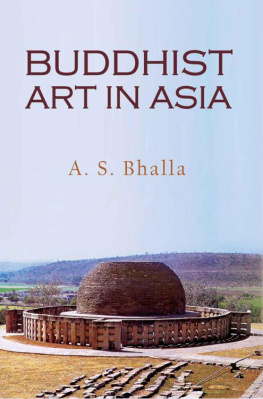Surjit S. Bhalla - Citizen Raj: Indian Elections, 1952–2019
Here you can read online Surjit S. Bhalla - Citizen Raj: Indian Elections, 1952–2019 full text of the book (entire story) in english for free. Download pdf and epub, get meaning, cover and reviews about this ebook. year: 2019, publisher: Westland, genre: Science. Description of the work, (preface) as well as reviews are available. Best literature library LitArk.com created for fans of good reading and offers a wide selection of genres:
Romance novel
Science fiction
Adventure
Detective
Science
History
Home and family
Prose
Art
Politics
Computer
Non-fiction
Religion
Business
Children
Humor
Choose a favorite category and find really read worthwhile books. Enjoy immersion in the world of imagination, feel the emotions of the characters or learn something new for yourself, make an fascinating discovery.
- Book:Citizen Raj: Indian Elections, 1952–2019
- Author:
- Publisher:Westland
- Genre:
- Year:2019
- Rating:4 / 5
- Favourites:Add to favourites
- Your mark:
- 80
- 1
- 2
- 3
- 4
- 5
Citizen Raj: Indian Elections, 1952–2019: summary, description and annotation
We offer to read an annotation, description, summary or preface (depends on what the author of the book "Citizen Raj: Indian Elections, 1952–2019" wrote himself). If you haven't found the necessary information about the book — write in the comments, we will try to find it.
Citizen Raj: Indian Elections, 1952–2019 — read online for free the complete book (whole text) full work
Below is the text of the book, divided by pages. System saving the place of the last page read, allows you to conveniently read the book "Citizen Raj: Indian Elections, 1952–2019" online for free, without having to search again every time where you left off. Put a bookmark, and you can go to the page where you finished reading at any time.
Font size:
Interval:
Bookmark:


Published by Westland Publications Private Limited in 2019Ist Floor A Block, East Wing, Plot No. 40, SP Infocity, Dr. MGR Salai, Perungudi, Kandanchavadi, Chennai 600096
Westland and the Westland logo are the trademarks of Westland Publications Private Limited, or its affiliates.
Copyright Surjit S. Bhalla, 2019
ISBN: 9789388689120
The views and opinions expressed in this work are the authors own and the facts are as reported by them, and the publisher is in no way liable for the same.
All rights reserved
No part of this book may be reproduced, or stored in a retrieval system, or transmitted in any form or by any means, electronic, mechanical, photocopying, recording, or otherwise, without express written permission of the publisher.
For all true liberals
Remember, to be objective is to be cruelto self
Hobbies, like passion, can be painful. When hobbies are passion, it can be doubly painful. As I was to find out when I embarked on this adventure of writing a book about a favourite interest of minethe analysis of elections. As anybody who has been courageous enough to forecast an election knowsthe best of your intentions, the hardest of your work, the deepest of your insights, and the best counter advice of your friends and family will often not be enough to prevent you from deep embarrassmenta wrong forecast. Shame on you! How could you get it so wrong, when it is intuitively obvious to the most casual observer, and so on.
It has happened to me not once, but twice before. Once in 1991 and the second in 2016Rajiv Gandhi and Hillary Clinton were my favourites. They both lost, unexpectedly. Given this history, I got wise. I would write a book on the electoral economy of India from 1952 to 2019enough for everybody to disagree with in every chapter, and as a consequence, generate some agreement, and some rights versus a forecast that may possibly go wrong.
That is the origin of this book. A desire to combine economic and political events in the context of the electoral history of India. Gives one an opportunity to vent on several issues of interest to many, and with a casual insertion of the one that most people are most interested inthe forecast.
An ambitious project requires support, and in that regard I have been luckier than most. I am thankful, indeed indebted, to Family and Friendsnow thats a TV serial worthy of consideration. The family has been supportive, and indulgent, in allowing me freedom, and space, to pursue this passion. Ravinder, Simran and Sahilthe last few months, I have been both absent and absent-minded. The extended debates on the political economy of India have been more helpful than you can imagine. Discussions with Suman Bery have helped to sharpen my thinking, and analysis, of the political, economic, and social transformation project that India is today.
Good friendly interactions with Arvind Virmani and Lord Meghnad Desai have helped sharpen my understanding of Indian politics. Ankur Choudhary, Sanjay Dutt, Varun Khandelwal, and Abhinav Motheram were ever helpful with discussions, and comments on drafts. Abhinav also helped out considerably with the research, and Rohini Sanyal was very helpful in the initial stages of this project. I am also thankful to Pradeep Chibber and Rahul Verma for their useful comments.
My editor Sudha Sadhanand has been more than kind, and supportive of this study, and I apologise for the delays and optimistic predictions of finishing. Thank you also for making this book read better, which should help it sell more.
By instinct I am a contrarianand how that is consistent with a DNA++ disposition, I honestly do not know. But if being both contrarian and optimistic helps make correct forecasts, I welcome the combination.
Yeh jo public hai, sab jaanti hai
Yeh jo public hai
(The people know everything
Nothing is hidden from the public)
Roti, 1974
It is show, sorry election, time. A few weeks hence, starting 11 April, the biggest tamasha in the world is going to happenthe Great Indian Election. By virtue of its population, everything about India is great, which is trueexcept of course China. But China is not a democracyhence, we will stick to the greatest tamasha unfolding in India.
This book is about the expectations around the winners and losers of this experiment, and sixteen other experiments that have happened since the first election in 1952. But on a serious note, I do less than justice to India, and to democracy in India, by calling it either a tamasha or a circus. This choice of word was deliberate. I wanted to highlight the change that has already occurred in India over the last seventy years.
Not so long ago, the elections were a grand festive affair with billboards and spectacles galore. As India has become more developed (less poor), the opportunity cost of time (the economists description of forced leisure time) has gone up i.e., we have less time for these events as more of us are otherwise occupied.
At the same time, even as time-value has gone up, turnouts in Indian elections have also increased. In Lok Sabha elections, the average turnoutdefined as the number of voters as a ratio of the electorate i.e., those eligible to votehas also increased, from a low of 53.5 per cent in 1975, to a high of 66.4 per cent in the last 2014 general election. For state electionsreferred to as assembly electionsthe turnout reached a high of 76.3 per cent in the 2018 elections held in six states. This is just one of the many indicators on offer to suggest that democracy is thriving, and well, amongst the Indian populace.
Not so long ago, the philosopher-economist and Nobel Prize winner, Prof Amartya Sen wrote a book called The Argumentative Indian. No book of his has ever rung truer. While this book does not discuss the causes behind what seems like a quintessential trait amongst we the people, let me just state that this is a characteristic that has been pointed out to me by every foreigner I have met. And no Indian disagrees. We are like that only. In the first chapter, I shall discuss the origins of Indian democracy suggesting that India became one, and stayed one, because of two necessary conditionsbeing colonised by the British, and being ethnically, and culturally, very diverse. If you add argumentation to the list, as one should, it really cements the case against those who believed, and continue to believe, that democracy is not the preferred habitat of the Indian.
I perfectly understand that the worth of my book might be decided by the accuracy of my forecast for the 2019 election. But that would be a huge disservice to the author! This book is mostly about the evolutionary process of Indian democracy, about where it was at inception in 1950 when the Constitution mandated a democratic form of government, about where it is today, and everything that has happened in-between.
Let us recount where we were at the time of independence. One of the poorest countries in the world (the rank in US dollar terms was eighth from the bottom, and twenty-third from the bottom in 1996 PPP dollars), we have come a long way, young woman! No matter what the criteria, India is a vastly transformed economy, with the added advantage that the mindset of the people took a significant rightward shift in 1991 and since 2014, there has been another decisive change in their thought-process. India was among the poorest of the poor, with over eighty-five per cent of the population defined as absolute poor by the World Bank dollar a day poverty line. We were therefore a very, very poor country in 1950.
Next pageFont size:
Interval:
Bookmark:
Similar books «Citizen Raj: Indian Elections, 1952–2019»
Look at similar books to Citizen Raj: Indian Elections, 1952–2019. We have selected literature similar in name and meaning in the hope of providing readers with more options to find new, interesting, not yet read works.
Discussion, reviews of the book Citizen Raj: Indian Elections, 1952–2019 and just readers' own opinions. Leave your comments, write what you think about the work, its meaning or the main characters. Specify what exactly you liked and what you didn't like, and why you think so.

